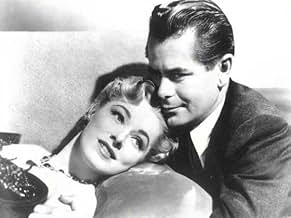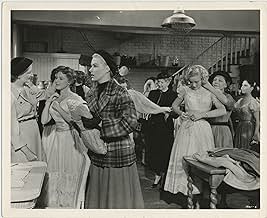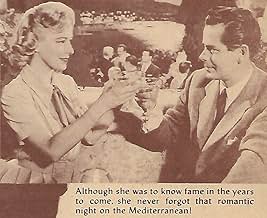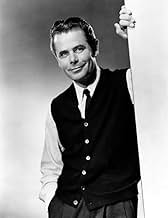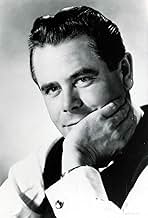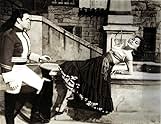AVALIAÇÃO DA IMDb
6,7/10
1,3 mil
SUA AVALIAÇÃO
Adicionar um enredo no seu idiomaThis movie chronicles Australian-born opera star Marjorie Lawrence's success, her battle with polio, and her eventual career comeback.This movie chronicles Australian-born opera star Marjorie Lawrence's success, her battle with polio, and her eventual career comeback.This movie chronicles Australian-born opera star Marjorie Lawrence's success, her battle with polio, and her eventual career comeback.
- Direção
- Roteiristas
- Artistas
- Ganhou 1 Oscar
- 1 vitória e 3 indicações no total
Phyllis Altivo
- Louise
- (não creditado)
Benjie Bancroft
- Doctor
- (não creditado)
Francis Barnes
- Singer
- (não creditado)
Louise Bates
- Party Guest
- (não creditado)
Mary Bayless
- Backstage Well-Wisher
- (não creditado)
George Blagoi
- Audience Member
- (não creditado)
Heinz Blankenburg
- Baritone
- (não creditado)
Lulu Mae Bohrman
- Backstage Well-Wisher
- (não creditado)
- Direção
- Roteiristas
- Elenco e equipe completos
- Produção, bilheteria e muito mais no IMDbPro
Avaliações em destaque
I was fortunate enough to be chosen as the stunt double for Eleanor Parker in this extraordinary film. I was in awe of her performance and cannot say how much I enjoyed working with her for several of her films. I thought the script was marvelous and did win an award I believe. Eleanor Parker is the true lady she portrayed in this once in a lifetime film. I never tire of seeing it - over and over again.
This film will always have a great significance to me because it introduced me to the beauty of opera. Marjorie Lawrence was a major soprano with the Metropolitan Opera, and her career was cut short by polio while she was still in her vocal prime. Her story is told with great sensitivity and warmth. The operatic scenes are done to perfection, with the superb soprano Eileen Farrell doing the vocals. Eleanor Parker is seen here in what must be her greatest work as an actress. Parker was a great, if somewhat under-appreciated actress, and she was a beautiful woman. Of course, it is she who dominates the movie. Glenn Ford provides excellent support as her doctor husband who guides her back to her career. When this film was released, I was ten years old, and kept going back again and again to see it over and over. I loved the music, loved the story, and will forever be indebted to it for having introduced me to the beauty of grand opera. If I had to choose a film as the most important of my life, it would have to be this one.
I am a great-niece of Marjorie Lawrence. It's a very sad fact that Marjorie is best known outside of Australia. However, she was recently honored as one of 100 Australian Entertainers of the Century. It's also a bit of a shame that this movie is a Hollywood producer's interpretation of an American publisher's version of my Great-Aunt's life. The real family story is actually much more interesting. Auntie Marj never smoked a cigarette in her life - but it seems everyone smoked in the movies of the 50s. My mother and my aunt attended the world premiere here in Melbourne. I remember meeting Auntie Marj as a child in the 70s.
Like others commenting on this film, I saw "Interrupted Melody" many years ago, and it left a deep impression on me. I found when watching it again that I had retained so many of the scenes in my memory.
"Interrupted Melody" tells the story of Australian soprano Marjorie Lawrence (played by Eleanor Parker), who was stricken with polio at the height of her career. The singer then has to find the courage to reclaim her will to live, her voice, and her career.
This is one of the few films, including anything of Lanza's, where entire arias and/or operatic scenes have been performed - and correctly. Singing for Ms. Parker is dramatic soprano Eileen Farrell, whose voice also acts. In the beginning, when the young Marjorie is in a vocal competition, Farrell takes her powerful chest voice out and instead carries her middle voice down to the low notes, giving the impression of a young, untrained singer. Truly inspired.
This has to be the high point of Eleanor Parker's career. I had a chance to see her nearly 30 years ago in a preview performance of "Pal Joey" - regretfully, there were many problems and she and her costar left the show before it opened. It was a shame, because Parker's Vera was wonderful. Here, she plays the young Marjorie with energy and determination, capturing the soprano's nervousness at being away from home when she goes to school in Monte Carlo. Later, she plays the perfect diva not afraid to state what she wants. Finally, she's the crippled Marjorie with no will to live, finding solace entertaining wounded soldiers who are worse off than she is. All through the film, she looks absolutely stunning, and her lipsyncing in Italian, French, and German is perfect.
The music is glorious - "Tristan und Isolde," "La Boheme," "Samson et Delilah," "Carmen," "Il Trovatore," (the fastest I've ever heard it), "Madama Butterfly," "Don Carlos," and "Gotterdammerung" - truly a feast for the ears with Eileen Farrell's magnificent singing.
Some have questioned whether or not Lawrence actually sang both mezzo and soprano roles. Lawrence did sing "Carmen," which can be sung by a dramatic soprano. Also, Lawrence probably started out as a mezzo - it was not until she trained in Paris that her upper range was extended. She sang Wagner, Strauss, Puccini, and Verdi in the big opera houses. "Samson and Delilah" was perhaps done for the film so we could see Eleanor Parker being sexy and seductive in a gauzy costume. The thing is, Lawrence's specialty was Wagner and you can't only have heavy Wagner scenes throughout a movie. The glamorous soprano did her own dancing in "Salome," and played the immolation scene in "Götterdämmerung" by riding her horse into the flames as Wagner had intended, making her one of the few, possibly the only, soprano to do this. She also did Thais, which calls for sex and beauty - "Thais" was the inspiration for the role Susan Kane bombed in during "Citizen Kane."
Glenn Ford plays Lawrence's husband, Dr. Thomas King, and the marriage of a successful opera star and fledgling pediatrician is realistically portrayed with all its difficulties. In real life, Tom King was an osteopath and a Christian Scientist. Ford has a background role much of the time, but also some very dramatic moments and some romantic ones. His gentle, easygoing style fit the character well. A very young Roger Moore is Marjorie's manager-brother.
If you love opera, or if you love a story of courage and the power of the human spirit, this film is for you. Have a box of tissues nearby - the ending is very powerful.
"Interrupted Melody" tells the story of Australian soprano Marjorie Lawrence (played by Eleanor Parker), who was stricken with polio at the height of her career. The singer then has to find the courage to reclaim her will to live, her voice, and her career.
This is one of the few films, including anything of Lanza's, where entire arias and/or operatic scenes have been performed - and correctly. Singing for Ms. Parker is dramatic soprano Eileen Farrell, whose voice also acts. In the beginning, when the young Marjorie is in a vocal competition, Farrell takes her powerful chest voice out and instead carries her middle voice down to the low notes, giving the impression of a young, untrained singer. Truly inspired.
This has to be the high point of Eleanor Parker's career. I had a chance to see her nearly 30 years ago in a preview performance of "Pal Joey" - regretfully, there were many problems and she and her costar left the show before it opened. It was a shame, because Parker's Vera was wonderful. Here, she plays the young Marjorie with energy and determination, capturing the soprano's nervousness at being away from home when she goes to school in Monte Carlo. Later, she plays the perfect diva not afraid to state what she wants. Finally, she's the crippled Marjorie with no will to live, finding solace entertaining wounded soldiers who are worse off than she is. All through the film, she looks absolutely stunning, and her lipsyncing in Italian, French, and German is perfect.
The music is glorious - "Tristan und Isolde," "La Boheme," "Samson et Delilah," "Carmen," "Il Trovatore," (the fastest I've ever heard it), "Madama Butterfly," "Don Carlos," and "Gotterdammerung" - truly a feast for the ears with Eileen Farrell's magnificent singing.
Some have questioned whether or not Lawrence actually sang both mezzo and soprano roles. Lawrence did sing "Carmen," which can be sung by a dramatic soprano. Also, Lawrence probably started out as a mezzo - it was not until she trained in Paris that her upper range was extended. She sang Wagner, Strauss, Puccini, and Verdi in the big opera houses. "Samson and Delilah" was perhaps done for the film so we could see Eleanor Parker being sexy and seductive in a gauzy costume. The thing is, Lawrence's specialty was Wagner and you can't only have heavy Wagner scenes throughout a movie. The glamorous soprano did her own dancing in "Salome," and played the immolation scene in "Götterdämmerung" by riding her horse into the flames as Wagner had intended, making her one of the few, possibly the only, soprano to do this. She also did Thais, which calls for sex and beauty - "Thais" was the inspiration for the role Susan Kane bombed in during "Citizen Kane."
Glenn Ford plays Lawrence's husband, Dr. Thomas King, and the marriage of a successful opera star and fledgling pediatrician is realistically portrayed with all its difficulties. In real life, Tom King was an osteopath and a Christian Scientist. Ford has a background role much of the time, but also some very dramatic moments and some romantic ones. His gentle, easygoing style fit the character well. A very young Roger Moore is Marjorie's manager-brother.
If you love opera, or if you love a story of courage and the power of the human spirit, this film is for you. Have a box of tissues nearby - the ending is very powerful.
I studied opera with Marjorie Lawrence and her students always enjoyed gathering to watch this film.
I studied opera with Marjorie Lawrence in the 1970's and she was an incredible, vital, and exciting personality. She was larger than life and her presence dominated any gathering she attended.
The movie captures many of her physical mannerisms. Her voice was most suited to the Wagnerian repertoire and the selection of the great Eileen Farrel to sing the more popular arias chosen for the film was an excellent one. However, Miss Lawrence was disappointed that her own voice wasn't used as had been agreed, which I understand resulted in a settlement in her favor.
Her husband, Doctor King, was an great gentleman and devoted to her.
Following the years depicted in the film, she became an educator at Southern Illinois University where she was very respected and loved.
The movie captures many of her physical mannerisms. Her voice was most suited to the Wagnerian repertoire and the selection of the great Eileen Farrel to sing the more popular arias chosen for the film was an excellent one. However, Miss Lawrence was disappointed that her own voice wasn't used as had been agreed, which I understand resulted in a settlement in her favor.
Her husband, Doctor King, was an great gentleman and devoted to her.
Following the years depicted in the film, she became an educator at Southern Illinois University where she was very respected and loved.
Você sabia?
- CuriosidadesEleanor Parker can read music, and has perfect pitch as a singer. She decided to study the scores of the opera songs used in this movie on her own. She rented a cabin in Lake Arrowhead, California, and played the records while singing along, until she had the breathing and phrasing memorized. Then when filming the scenes, instead of lip-synching to the tracks recorded by Eileen Farrell for the movie, she sang full voice (but an octave lower). She is proud of the fact that they never had to do a re-take, in order to "match" the tapes. She nailed it on the first take every time.
- Erros de gravaçãoAfter Marjorie sings "Annie Laurie" and she wheels herself into the kitchen and she suggests a concert tour, right as she and Dr. King are embracing .
- Citações
Marjorie Lawrence: [drinking champagne] Tonight I love the whole world and I want them to know it.
Dr. Thomas King: And tomorrow you'll have a monumental hangover.
Marjorie Lawrence: That's the advantage of going out with doctors.
- ConexõesFeatured in 1955 Motion Picture Theatre Celebration (1955)
- Trilhas sonorasDon Carlos
(1867) (uncredited)
Music by Giuseppe Verdi
Libretto by François Joseph Méry and Camille du Locle
Aria "O don fatale" Performed by Eleanor Parker (dubbed by Eileen Farrell) with piano accompaniment
Principais escolhas
Faça login para avaliar e ver a lista de recomendações personalizadas
- How long is Interrupted Melody?Fornecido pela Alexa
Detalhes
- Data de lançamento
- País de origem
- Idiomas
- Também conhecido como
- La melodía interrumpida
- Locações de filme
- Empresa de produção
- Consulte mais créditos da empresa na IMDbPro
Bilheteria
- Orçamento
- US$ 2.367.000 (estimativa)
- Tempo de duração1 hora 46 minutos
- Proporção
- 2.55 : 1
Contribua para esta página
Sugerir uma alteração ou adicionar conteúdo ausente

Principal brecha
By what name was Melodia Interrompida (1955) officially released in India in English?
Responda


